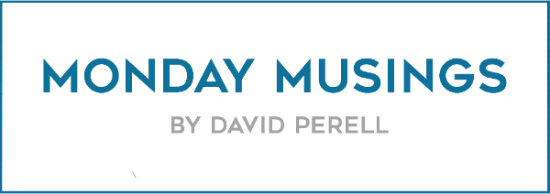
Oh hello,
Greetings from California! Spending the week in Los Angeles, where I’ll be hosting podcast interviews, walking barefoot on the beach, and meeting Monday Musings subscribers.
I might have extra time, so if you’re in Los Angeles and want to meet up, let me know by responding to this email.
Most people have goals. A list of questions helps too. If goals guide our actions, questions are the light of curiosity. Questions stir in our subconscious and linger in the back-alleys of the mind.
As the famous scientist Richard Feynman once said:
"You have to keep a dozen of your favorite problems constantly present in your mind, although by and large they will lay in a dormant state. Every time you hear or read a new trick or a new result, test it against each of your twelve problems to see whether it helps. Every once in a while there will be a hit, and people will say: ‘How did he do it? He must be a genius!'”
Inspired by Feynman, here’s a list of questions I can’t stop thinking about:
How can we improve small group learning + communication? When small group trust is high, you can explore fringe and controversial ideas. In 1-on-1 chat, communication has to be symmetric. In group chats, you can consume more than you produce. Tutoring is also under-rated. Along with some friends, I’m thinking about hiring a graduate student in New York to tutor me a couple times per week. Small-group tutoring is a cost-effective way to master difficult subjects.
How can we accelerate the spread of interesting ideas? Many of the best ideas are trapped inside people’s heads. If we can lower the barriers to idea sharing, we can accelerate society’s pace of learning. Most of the world's smartest people don't share *anything* publicly.
When should we trust tradition and when should we trust novelty? The world is changing... fast! Media. Money. Careers. Relationships. Governance. You name it. Sometimes, it’s wise to trust the wisdom of time. Sometimes, it isn’t. Over the weekend, a friend offered an interesting answer: Wisdom is a great way to avoid risk of ruin, but will prevent you from making breakthrough innovations. How should we evaluate this dilemma?
How can we improve reading?
Food for thought:
Personal recommendation engines for books.
Marketplaces for annotations, summaries, and takeaways.
Internet-native book clubs with experts and friends with similar interests.
Software to improve reading retention.
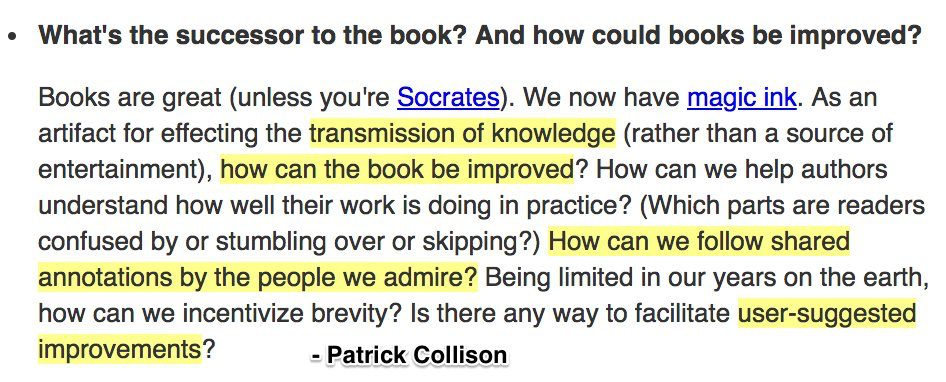
What are simple, easy-to-remember ways to improve your physical health?
Ideas:
Sauna + steam rooms
Time restricted eating
High-intensity interval training
Weightlifting
Limit sugar, processed food, vegetable oils, and refined carbohydrates
8 hours of sleep
How can we accelerate personal feedback loops?
Many problems in life can be fixed with a tight feedback loop. Software can incentivize productive behavior by helping us visualize the long-term benefits of good behavior and pull the pleasure of good behavior forward.
How can video accelerate learning?
We under-rate social and visual learning. As a friend observed over the weekend, books may no longer be appropriate for most people in 2018. Perhaps, we shouldn’t universally promote them as much as we do. Media is becoming much more immersive. As a result, the opportunity cost of books may be rising.
To be sure, I’m a huge proponent of books. I spend hours reading every week. With that said, young people increasingly learn through video. Humans are great at copying people they admire. Through videos, we can teach behaviors that can’t be communicated through text.
How can we help people in their 20s pursue ambitious projects?
In your 20s, your energy levels are sky-high and you have very few commitments. Student debt is the biggest constraint. If you're drowning in student debt, earning a high salary has to be your #1 priority.
How can we raise the aggregate level of ambition in society?
Ideas:
Personalized learning curricula.
Raise the status of scientists and innovators.
Support ideas with big upside and low rates of success.
Incentivize a culture of mentorship and apprenticeship.
Where are we stagnating? Where are we innovating?
We see innovation in communications technology. But we're stagnating elsewhere in areas such as:
Education
Productivity growth
Transportation speeds
Real male median wages since 1970
What’s happening?
Fresh Ideas
North Star Podcast: Patri Friedman
Patri Friedman is a political theorist who’s on a mission to increase competition in government. In 2008, Patri founded the Seasteading Institute with a mission create sovereign ocean colonies and "establish permanent, autonomous ocean communities to enable experimentation and innovation with diverse social, political, and legal systems.”
Topics of conversation:
Incredible foresight of Marshall McLuhan
Impact of modern technology on government
Future of the nation state
Rise of city states
Digital addictions in the internet age.
This episode is everything the North Star Podcast is supposed to be: wild, wacky, weird, and wonderful.
You can listen on iTunes, Overcast, or on my website.
New Article: The Customer Acquisition Pricing Parade
I co-wrote this post with Nik Sharma, who runs all-things-digital at Hint Water. Nik is one of the smartest marketers I know, and whenever we’re together, we jam on the craziest marketing ideas. Inspired by a conversation at Mel’s Diner in San Francisco last week, we shared our thoughts on the future of marketing and the ever-growing customer acquisition bubble.
Our article centers around four key points:
Today, many of the biggest direct to consumer (DTC) and digitally native vertical brands (DNVBs) battle for the same affluent urban Millennials. Silicon Valley marches to the beat of three words: Growth. Growth. Growth.
To decrease spending and increase profitability, the holding companies of tomorrow will shift their attention from controlling supply to controlling demand — from building around industries to building around audiences.
Roughly 80% of Glossier's growth comes from peer-to-peer recommendations, and their main retail establishment generates more sales revenue per square foot than the average Apple store.
Companies who cater to their customers and develop direct relationships with them will own the future.
You can read the article here.
Coolest Things I Learned This Week
Question: Does Poor Eyesight Make you Smarter?
We know that losing one sense makes you better at others For example, losing eyesight improves hearing. Why? Apparently, (in the event of blindness) the brain rewires itself and uses the visual areas as auditory ones.
Vision is such an important sense for humans that a huge portion of the brain is devoted to visual processing—far more gray matter than is dedicated to any other sense. In blind people all this brain power would go to waste, but somehow an unsighted person’s brain rewires itself to connect auditory regions of the brain to the visual cortex.
Nerves from muscles that control our eye movements, for example, connect to the brain’s hearing centers as well. These connections between visual and auditory regions of the brain become strengthened after losing sight. Also, some regions of cerebral cortex that border visual and auditory cortices—the left fusiform gyrus, for example—expand territory in blind people to make use of the idle circuitry in visual cortex.
How to Tell How Tall a Tree Is
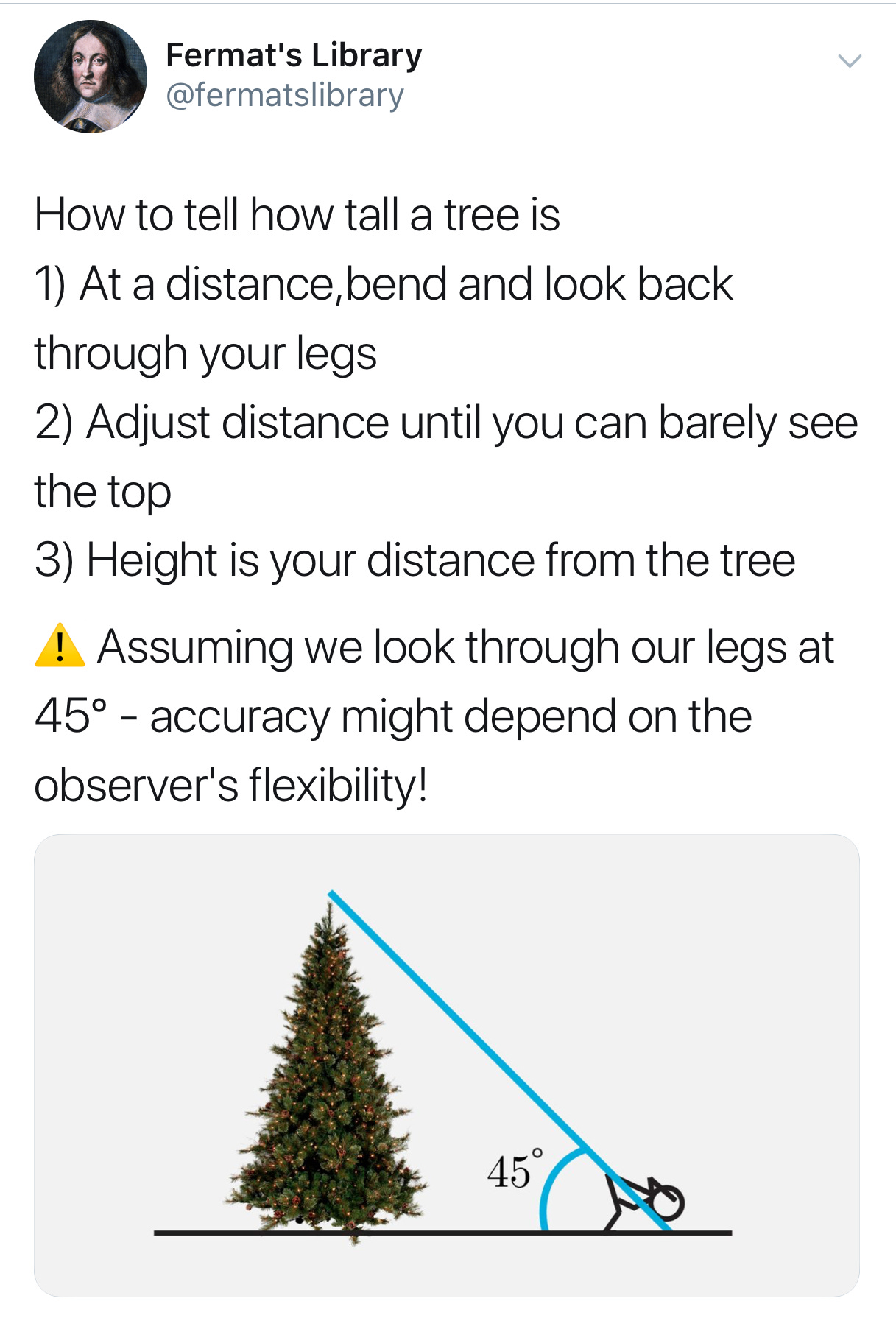
The Internet is Like Tokyo
From Derek Thompson, a recent North Star Podcast guest:
"What advice do you give to a recent college grad who comes up to you and says "I'm Interested in journalism and writing books?”
Derek Thompson: “There is a paradox to scale, I think.
People who want to be big sometimes think I have to immediately reach the largest possible audience — but in a weird way, the best way to produce things that take off is to produce small things. To become a small expert. To become the best person on the internet at understanding the application of Medicaid to minority children, or something like that.
And the reason why I think this is true is I call my Tokyo example. If you go to Tokyo, you'll see there are all sorts of really, really strange shops. There'll be a shop that, only 1970's vinyl and like, 1980's whisky or something. And that doesn't make any sense if it's a shop in a Des Moines suburb. In a Des Moines suburb, to exist, you have to be Subway, you have to hit the mass-market Immediately.
But in Tokyo, where there's 30-40 million people within a train ride of a city, then your market is 40 million. And within that 40 million, sure, there, a couple thousand people who love 1970's music and 1980's whisky. The Internet is Tokyo. The Internet allows you to be niche at scale.
Niche at scale is something that I think young people should aspire to."
Great Design: Baskets to Communicate if You Want Help at the Store
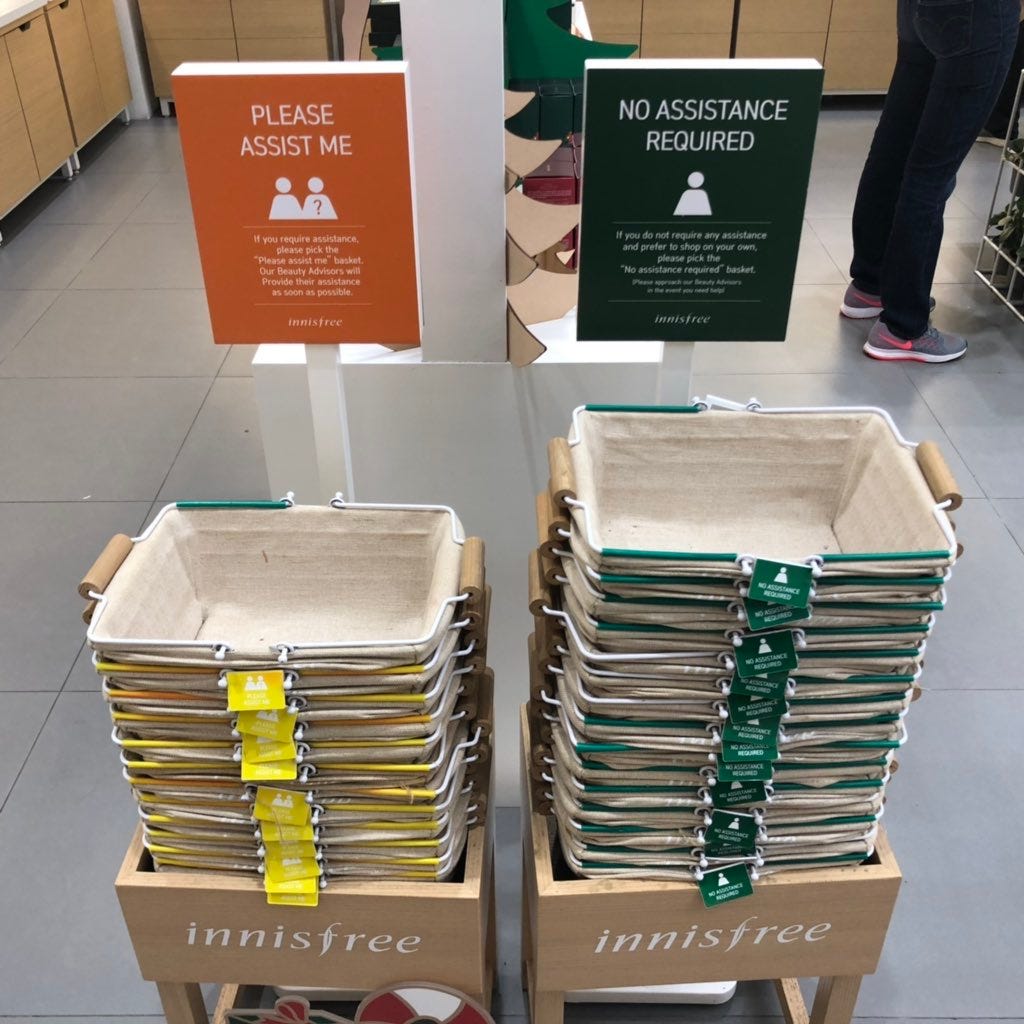
This Will Make Your Day…
A nine year old girl named Riley Morrison asked Stephen Curry why his sneakers don’t come in girls sizes. Stephen responded.
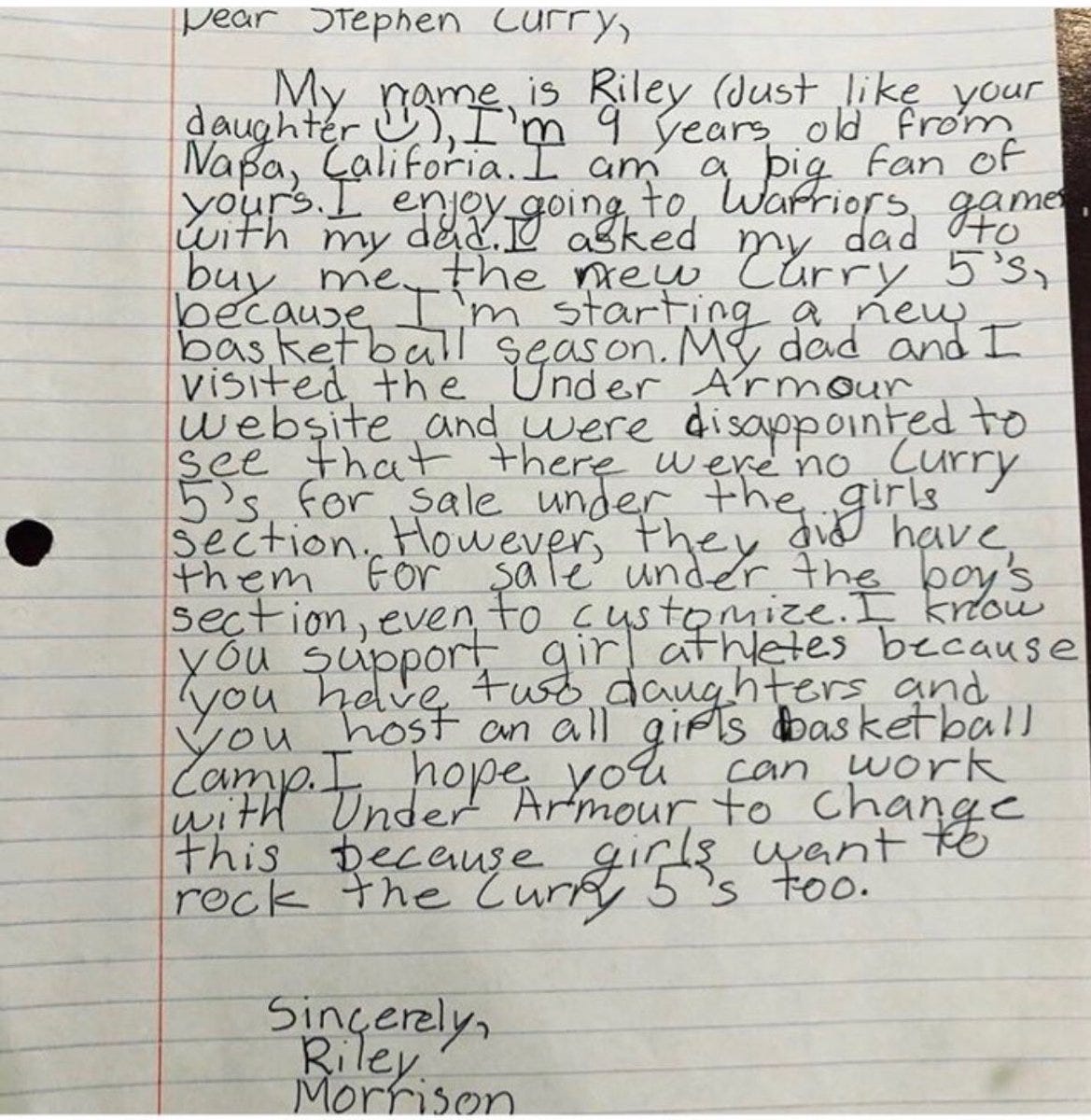
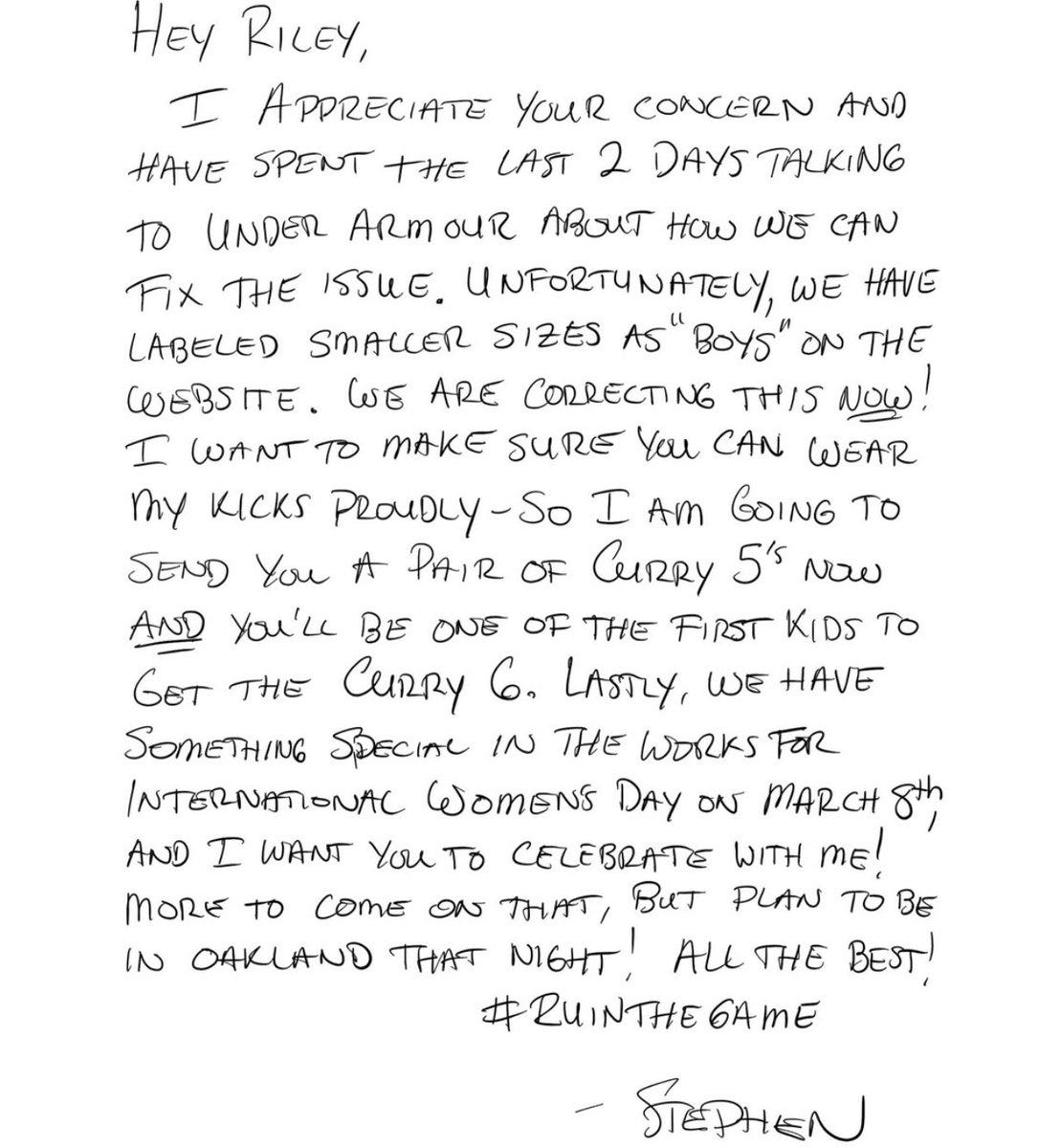
Thanks Internet! Here’s a list of random facts.
35% of Rwanda’s national blood supply outside the capital city is now delivered by drone.
Advertisers place a single brown pixel on a bright background in an mobile ad. It looks like dust, so users try to wipe it off. That registers as a click, and the user is taken to the homepage.
In Uganda, half the population is under the age of 15.
Air crews are exposed to more radiation than people who work at nuclear power stations.
In 2016, Singapore police reported 135 total days without any crimes including snatch-theft, house break-ins and robbery.
On Netflix, the artwork is personalised based on your viewing history. An Uma Thurman fan will see the classic Pulp Fiction poster showing Uma, but a John Travolta fan will be shown a different image
Expensive placebos work better than cheap placebos
Almost 20 years ago, Japanese railway stations started installing blue LED panels on platforms as a suicide prevention measure, believing that blue light improves mood. A ten-year study found an 84% decline in suicide attempts at stations where lights were installed, with no decline at stations without lights
54 percent of Chinese born after 1995 chose “influencer” as their most desired occupation
Kojo Yakei is a Japanese trend of night-time factory tours, admiring industrial architecture by boat, train or bus.
In Tunisia, anyone who wants to found a startup can apply for one year’s ‘Startup Leave’ from their company. The government then pay a salary to the startup team, based on their previous income
“In 2001, the Thai government established the Global Thai Restaurant Company, Ltd., in an effort to establish at least 3,000 Thai restaurants worldwide.”
Photo of the Week
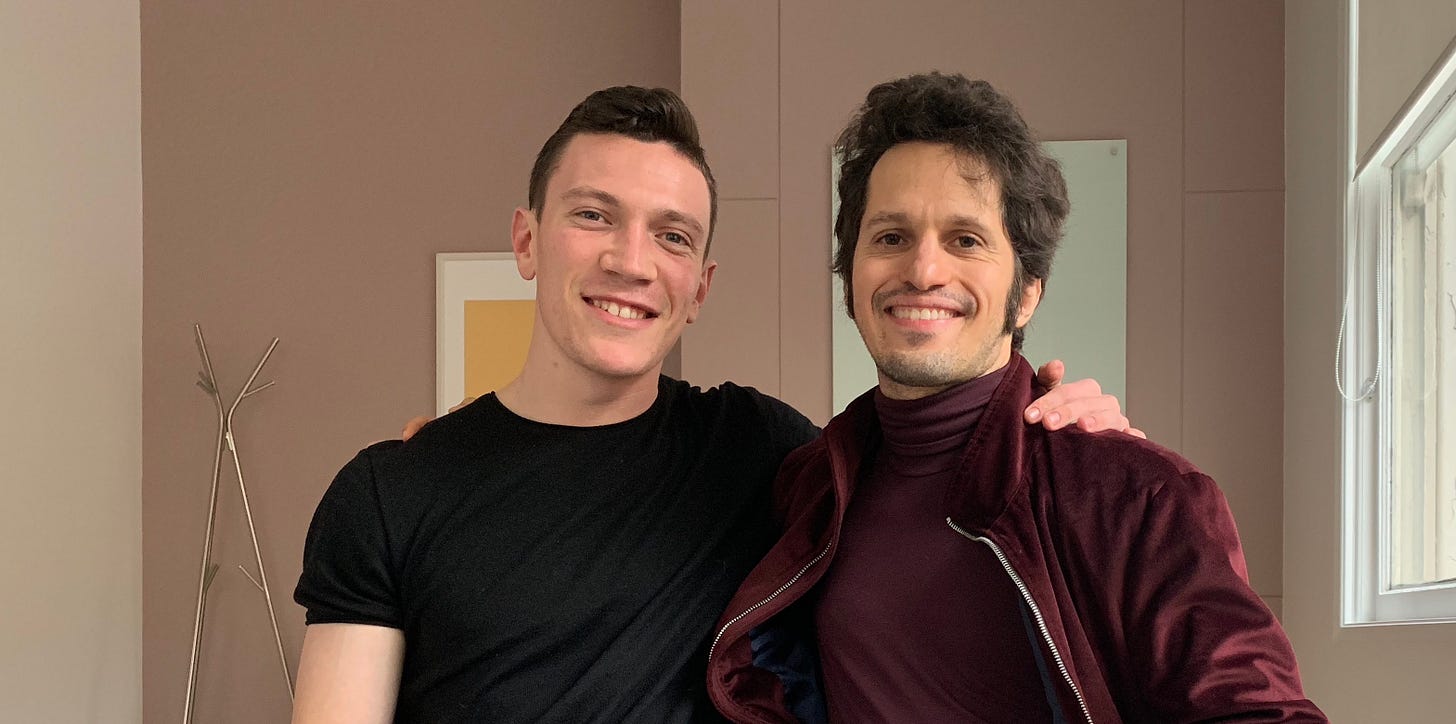
Every now and then, I meet somebody with truly original ideas. Patri Friedman deserves special recognition for being a perfect example. He comes from a long lineage of libertarian ideas. His grandfather, Milton Friedman is a Nobel Prize Winning economist, and his father, David Friedman, sketched forms of Anarcho-capitalism in the 1970s. True to the family name, Patri is the coolest person I’ve met recently.
While you won’t agree with everything Patri says, he’ll stop and make you think. I can guarantee — 100% guarantee — that you’ll walk away with a different way of seeing the world. As I mentioned above, this North Star episode is wild, wacky, and wonderful.
Enjoy the podcast, have a great week, and thank you for reading!
David Perell

